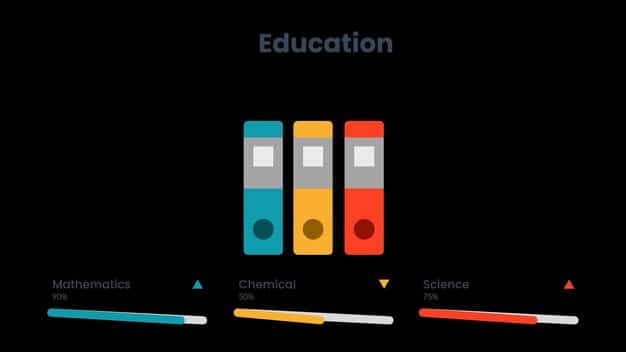SEL’s Impact on Gen Z Academic Performance: Latest Research

Recent research consistently indicates that Social-Emotional Learning (SEL) programs positively influence Generation Z’s academic performance by enhancing self-awareness, self-management, social awareness, relationship skills, and responsible decision-making, leading to improved engagement and achievement in educational settings.
In an increasingly complex world, educators and policymakers are constantly seeking innovative approaches to support student well-being and academic achievement. A critical area of focus has emerged around the profound influence of Social-Emotional Learning (SEL) programs on Gen Z’s academic performance. This generation, facing unique challenges from digital saturation to global uncertainties, presents novel considerations for educational interventions aimed at fostering holistic development.
Understanding Social-Emotional Learning (SEL) for Gen Z
Social-Emotional Learning, commonly known as SEL, encompasses the processes through which individuals acquire and apply the knowledge, attitudes, and skills necessary to understand and manage emotions, set and achieve positive goals, feel and show empathy for others, establish and maintain positive relationships, and make responsible decisions. For Gen Z, born roughly between 1997 and 2012, these skills are particularly pertinent as they navigate a hyper-connected, rapidly changing environment. The framework provided by the Collaborative for Academic, Social, and Emotional Learning (CASEL) outlines five core competencies that form the backbone of most SEL programs: self-awareness, self-management, social awareness, relationship skills, and responsible decision-making.
These competencies are not merely “soft skills”; they are foundational for success in academics, careers, and life. Research increasingly demonstrates that these abilities contribute directly to a student’s capacity to learn, retain information, and apply knowledge effectively. For Gen Z, who often exhibit high levels of digital literacy but may struggle with face-to-face communication or emotional regulation, SEL acts as a crucial counterbalance, equipping them with the tools they need to thrive both online and offline. The integration of SEL into curricula aims to create a more supportive and engaging learning environment, addressing the holistic needs of students beyond traditional cognitive development.
The CASEL Framework: A Holistic Approach
The CASEL framework provides a comprehensive and widely adopted structure for understanding and implementing SEL. It emphasizes that these competencies are interconnected and can be taught and learned in various contexts, from classrooms to homes and communities. The application of this framework within educational settings strives to foster well-rounded individuals who are prepared to face the complexities of the modern world.
- Self-Awareness: Recognizing one’s own emotions, thoughts, and values, and how they influence behavior.
- Self-Management: Regulating one’s emotions, thoughts, and behaviors effectively in different situations.
- Social Awareness: Understanding the perspectives of others and empathizing with individuals from diverse backgrounds.
- Relationship Skills: Establishing and maintaining healthy and supportive relationships.
- Responsible Decision-Making: Making constructive choices about personal and social behavior.
Ultimately, SEL programming seeks to cultivate resilience, empathy, and critical thinking—qualities that not only boost academic performance but also contribute to overall mental health and future success. These programs are designed not as an add-on, but as an integral part of a student’s educational journey, recognizing that emotional and social health are inseparable from intellectual growth.
Academic Performance Indicators Influenced by SEL
When assessing the impact of SEL programs on academic performance, researchers typically examine a range of indicators. These go beyond mere test scores and encompass a broader spectrum of educational outcomes. Improved grades and standardized test scores are often the most direct measures, but shifts in attendance, disciplinary referrals, student engagement, and classroom behavior also serve as crucial metrics. For Gen Z, who thrive on relevance and authentic connection, SEL’s effect on these broader indicators can be particularly pronounced, leading to a more positive and productive learning environment.
Furthermore, SEL programs have been shown to reduce instances of bullying and school violence, creating a safer and more inclusive space for learning. When students feel secure and supported, they are better able to focus on their studies. An increase in positive peer interactions and a stronger sense of community within schools are also frequently observed, contributing to a more cohesive and effective educational setting. These improvements collectively foster an atmosphere conducive to academic growth and personal development.
Direct and Indirect Academic Benefits
The benefits of SEL manifest both directly and indirectly on academic performance. Direct benefits include the enhancement of cognitive skills necessary for learning, such as attention, memory, and problem-solving. Indirect benefits stem from improved emotional regulation and social interactions, which reduce distractions and create a more conducive learning environment. These interlinked improvements contribute significantly to overall student success.
- Improved Grades and Standardized Test Scores: Students with strong SEL skills often demonstrate better academic outcomes.
- Increased Attendance and Reduced Disciplinary Issues: A positive school environment fostered by SEL leads to fewer absences and behavioral problems among students.
- Enhanced Engagement and Motivation: SEL helps students develop a sense of purpose and connection to their learning, leading to greater participation.
- Better Classroom Behavior and Reduced Suspensions: The development of self-management skills contributes to a more orderly and productive classroom.
These indicators collectively offer a comprehensive view of how SEL programs contribute to academic success. For Gen Z, whose educational experiences are often shaped by digital environments, developing these foundational social and emotional skills can be particularly transformative, preparing them for future academic and professional endeavors.
Recent Research Findings: Quantitative Data and Meta-Analyses
Recent years have seen a surge in rigorous research on SEL, with a significant portion focusing on its measurable impact on academic outcomes. Meta-analyses, which synthesize findings from multiple studies, consistently demonstrate a positive correlation between SEL program participation and various academic performance indicators. A landmark 2017 meta-analysis by CASEL, for instance, involving over 250 studies and 270,000 students, found that students participating in SEL programs showed an 11 percentile-point gain in academic achievement compared to their peers. This robust evidence underscores the effectiveness of SEL interventions across diverse school settings and student populations, including Gen Z.
More specifically for Gen Z, studies are beginning to disentangle the nuances of SEL’s influence within this technologically adept but often emotionally vulnerable demographic. Research indicates that SEL helps Gen Z students manage digital stressors, improve focus in hybrid learning environments, and navigate complex social dynamics both online and offline. Quantitative data often points to reductions in anxiety and depression symptoms, which are significant barriers to academic performance, and corresponding improvements in their ability to concentrate and engage with learning materials.

Longitudinal Studies and Lasting Impacts
Longitudinal research provides valuable insights into the sustained effects of SEL. These studies track students over extended periods, revealing that the benefits of SEL extend well beyond the immediate program duration, contributing to long-term academic success and overall well-being. This suggests that SEL is not a temporary fix but rather an investment in students’ future capabilities.
- Sustained Academic Gains: Longitudinal studies often show that academic improvements seen in SEL participants persist years after program completion.
- Reduced Risk Behaviors: SEL is linked to a decrease in substance abuse, violence, and other high-risk behaviors, which indirectly supports academic focus.
- Increased Graduation Rates: Students with strong social-emotional skills are more likely to complete high school and pursue higher education.
- Improved Mental Health Outcomes: Long-term SEL engagement is associated with lower rates of anxiety, depression, and stress, fostering a healthier mindset for learning.
These findings collectively reinforce the notion that SEL is a powerful tool for enhancing academic performance among Gen Z. The quantitative data consistently points towards meaningful and lasting improvements, suggesting that investing in these programs yields substantial returns in educational outcomes.
Qualitative Insights: Student and Educator Perspectives
Beyond the numbers, qualitative research offers a rich tapestry of perspectives from students and educators themselves, providing deeper insights into how SEL truly impacts academic life for Gen Z. Students often report feeling more connected to their peers and teachers, describing a classroom atmosphere that fosters psychological safety and reduces stress. This improved emotional climate directly contributes to their willingness to participate, ask questions, and take academic risks. Many Gen Z students articulate how specific SEL strategies, such as mindfulness or conflict resolution techniques, have directly enhanced their ability to focus during lessons or manage exam anxiety, translating into better performance.
Educators, on the other hand, frequently highlight how SEL transforms their teaching practice and classroom management. They observe marked improvements in student self-regulation, empathy, and collaborative skills, which streamline group projects and classroom discussions. Teachers often report less time spent on behavioral issues and more on instruction, leading to a more efficient and effective learning environment. They also note that students who engage in SEL are more resilient in the face of academic challenges, demonstrating greater perseverance and a “growth mindset” crucial for learning from mistakes.
Stories from the Classroom
Real-world anecdotes and case studies further illuminate the qualitative impact of SEL. These narratives often reveal the personal transformations students undergo, from overcoming shyness to resolving peer conflicts, all of which indirectly bolster their academic confidence and engagement. Educators’ testimonials frequently emphasize the shift from reactive behavior management to proactive skill-building, empowering students to take ownership of their learning journey.
One teacher shared how a student, initially withdrawn and struggling with group work, flourished after engaging in SEL exercises focused on communication and empathy. This student not only started contributing actively but also became a natural leader within the class, showcasing how SEL skills can unlock academic potential. Another example involved a student who used self-management techniques learned in an SEL lesson to calm anxiety before a major presentation, leading to a successful delivery and improved grade. These stories underscore the tangible difference SEL makes in students’ daily academic lives.
These qualitative accounts provide compelling evidence that SEL is not just about abstract skills; it translates into concrete improvements in the classroom, demonstrating its profound impact on Gen Z’s academic readiness and overall school experience.
Challenges and Considerations in SEL Implementation
Despite the growing body of evidence supporting SEL, its effective implementation is not without challenges. One significant hurdle lies in adequate teacher training and professional development. Many educators, while recognizing the value of SEL, may lack the specific pedagogical skills or confidence to integrate it seamlessly into their existing curricula. Investing in comprehensive, ongoing training is crucial to ensure that SEL is delivered authentically and consistently, rather than as an isolated add-on. Another challenge is the need for systemic support; SEL cannot thrive in a vacuum. It requires buy-in from school leadership, parents, and the wider community to create a pervasive culture of social-emotional well-being. Without this broader ecosystem, individual classroom efforts may yield limited results.
Furthermore, measuring the nuanced outcomes of SEL, particularly the long-term impacts, can be complex. While academic performance offers a tangible metric, assessing improvements in empathy, self-awareness, or responsible decision-making requires sophisticated evaluation tools. Schools often grapple with selecting appropriate assessment methods that capture the true breadth of SEL’s influence without becoming overly burdensome or reductive. For Gen Z, who are accustomed to instant feedback and personalized experiences, finding relevant and engaging ways to track their social-emotional growth is essential to maintain their buy-in and motivation.
Ensuring Program Fidelity and Cultural Responsiveness
The fidelity of program implementation—ensuring that SEL curricula are delivered as intended—is another critical consideration. Deviations from established frameworks can dilute effectiveness. Equally important is cultural responsiveness, adapting SEL content to resonate with the diverse backgrounds and experiences of Gen Z students. A “one-size-fits-all” approach may fall short in addressing the unique needs and cultural nuances of different student populations.
- Teacher Training and Buy-in: Ensuring educators are well-equipped and committed to delivering SEL.
- Systemic and Community Support: Integrating SEL beyond the classroom walls for holistic impact.
- Effective Measurement and Assessment: Developing robust tools to track the multifaceted benefits of SEL.
- Program Fidelity and Adaptability: Balancing adherence to program design with responsiveness to student needs.
Addressing these challenges requires a dedicated, long-term commitment from educational institutions and a willingness to continually adapt and refine strategies based on ongoing research and feedback. Overcoming these hurdles is essential to maximizing the significant potential of SEL programs for Gen Z’s academic and personal development.
Future Directions for SEL Research and Practice
The field of Social-Emotional Learning is continuously evolving, with exciting new directions emerging in both research and practice, particularly concerning Gen Z. One key area of future inquiry involves exploring the interplay between SEL and digital well-being. As Gen Z lives much of their lives online, understanding how SEL can mitigate the negative impacts of social media (e.g., cyberbullying, comparison culture) while leveraging its positive aspects (e.g., online collaboration, digital empathy) is paramount. Research needs to investigate specific SEL strategies tailored for digital natives, helping them develop responsible online decision-making and healthy digital habits. This includes examining the effectiveness of SEL delivered through online platforms or integrated into digital learning tools.
Another important trajectory is the investigation of SEL’s long-term economic and societal impacts. Beyond academic performance, understanding how SEL skills translate into career readiness, civic engagement, and overall adult well-being for Gen Z will provide further justification for widespread implementation. This includes studies on how SEL contributes to reduced crime rates, improved public health outcomes, and increased productivity in the workforce. Such research will require extensive longitudinal studies and interdisciplinary collaboration to fully capture the far-reaching benefits of social-emotional development across the lifespan for this generation.

Personalized SEL and Data-Driven Approaches
The future of SEL also points towards greater personalization and data-driven approaches. Leveraging artificial intelligence and learning analytics could allow for SEL interventions to be tailored to individual student needs, providing targeted support based on their unique emotional and social profiles. This would move beyond a “one-size-fits-all” model to a more adaptive and responsive system, potentially maximizing impact and efficiency.
- Digital Well-being Integration: Research on SEL strategies for navigating the complexities of online life.
- Long-term Societal and Economic Impacts: Examining how SEL skills translate into adult success and societal benefits.
- Personalized SEL Interventions: Utilizing technology and data to tailor SEL support to individual student needs.
- Interdisciplinary Collaboration: Fostering partnerships between education, psychology, and technology to advance SEL.
Ultimately, future research and practice in SEL will continue to refine our understanding of how best to support Gen Z’s holistic development, ensuring they are not only academically successful but also resilient, empathetic, and prepared to thrive in an ever-changing world. The continued investment in this field promises significant returns for individuals and society at large.
| Key Aspect | Brief Description |
|---|---|
| 🧠 Improved Cognition | SEL enhances attention, memory, and problem-solving skills, leading to better academic engagement. |
| 📈 Academic Gains | Meta-analyses show SEL participants gain 11 percentile points in academic achievement. |
| ❤️ Enhanced Well-being | SEL reduces anxiety and depression, fostering a positive mindset for learning in Gen Z. |
| 🎯 Future Readiness | SEL prepares Gen Z for future challenges by building resilience, empathy, and responsible decision-making. |
Frequently Asked Questions About SEL and Gen Z
Social-Emotional Learning (SEL) is the process through which individuals develop fundamental skills to understand and manage emotions, set and achieve positive goals, feel and show empathy for others, establish and maintain positive relationships, and make responsible decisions. It’s a holistic approach to education.
For Gen Z, SEL programs improve focus, reduce stress and anxiety related to academics, and enhance crucial skills like problem-solving and collaboration. These programs also help Gen Z navigate digital pressures, leading to increased classroom engagement and better learning outcomes.
Yes, meta-analyses consistently show that students in SEL programs achieve significant academic gains. Participants often show an 11 percentile-point gain in academic achievement, along with improved grades, test scores, attendance, and reduced disciplinary issues compared to peers not in SEL programs.
Key challenges include ensuring adequate teacher training and professional development, securing systemic and community-wide support, effectively measuring nuanced social-emotional outcomes, and maintaining program fidelity while adapting to diverse student populations. Addressing these requires ongoing effort and resources.
Future research will focus on integrating SEL with digital well-being, exploring long-term economic and societal impacts, and developing more personalized, data-driven SEL interventions. The goal is to maximize relevance and effectiveness for Gen Z’s unique context and evolving needs.
Conclusion
The compelling and growing body of research unequivocally demonstrates that Social-Emotional Learning (SEL) programs have a profound and positive impact on Gen Z’s academic performance. From enhancing core cognitive skills and improving grades to fostering better classroom behavior and reducing anxiety, SEL equips this generation with essential tools for navigating the complexities of modern education and beyond. While implementation challenges exist, sustained investment in comprehensive teacher training, systemic support, and culturally responsive approaches can help maximize the significant potential of SEL. As we look to the future, tailoring SEL for digital natives and exploring its broader societal benefits will further solidify its role as a cornerstone of holistic education, preparing Gen Z not just for academic success but for thriving in an ever-evolving world.